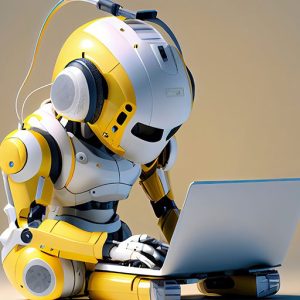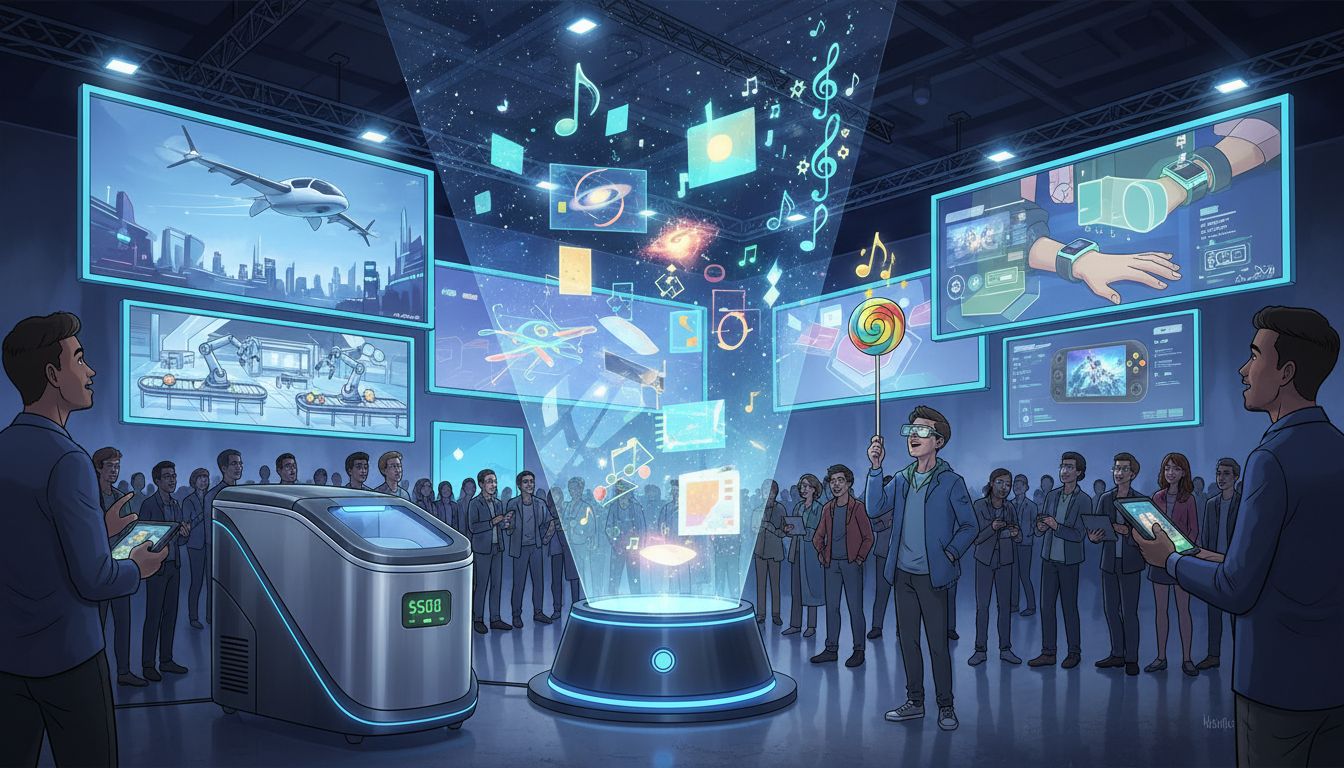It feels like every other news story is about robots taking over. You see headlines about artificial intelligence and immediately think your job is on the chopping block. But that’s not the whole story, not by a long shot. While some tasks are being automated, a whole new landscape of AI job roles is opening up right now.
People get worried because change is scary. But this isn’t about humans vs. machines. This is about how we can work with these new tools.
You’ll learn that the growth in AI job roles is creating opportunities you might not even know exist yet. Forget the scary sci-fi movies. The reality is much more interesting and filled with potential if you know where to look.
Table of Contents:
- What’s Really Happening with AI and Jobs?
- The Hot New AI Job Roles You Need to Know About
- Machine Learning Engineer: The Builder
- How Companies Fill These New AI Roles
- Getting Your Foot in the Door: Skills and Certifications
- Conclusion
What’s Really Happening with AI and Jobs?
So, let’s get real for a moment. Are robots coming for every single job? The short answer is no. That’s not how technological shifts typically work.
Think about the invention of the internet. It changed everything, right? It made some jobs obsolete, but it also created millions of new ones like web developers, social media managers, and digital marketers. AI is having a similar effect on the modern workforce.
According to the World Economic Forum, while AI may displace some roles, it is projected to create millions more by 2025. It’s a workforce transformation, not a complete replacement. This is about technology giving us a new set of tools to solve bigger and more interesting problems.
The Hot New AI Job Roles You Need to Know About
You might be wondering what these new jobs actually are. They sound technical and maybe a little intimidating. But many of them mix technical skills with creative thinking. Let’s break down some of the most exciting AI job roles appearing across industries.
These aren’t just for coders. They’re for communicators, thinkers, and planners, too. There’s a spot for a lot of different talents in this new professional world.
Prompt Engineer: The AI Whisperer

This is probably one of the newest and most talked-about titles. A prompt engineer is an expert communicator, but for AI. They figure out the best way to ask an AI a question to get the most useful answer.
It’s part art and part science. You need to understand how a large language model processes information. Then you craft questions and instructions that guide it to the perfect output, whether it’s an article, a piece of code, or a business strategy.
Companies are hiring for this role because the quality of an AI’s output depends entirely on the quality of the input. A great prompt engineer can make an AI tool substantially more powerful and reliable, saving time and generating better results.
AI Ethics Officer: The Moral Compass

With great power comes great responsibility. As AI gets more integrated into our lives, from hiring decisions to medical diagnoses, we need to make sure it’s fair. An AI ethics officer works to prevent bias in algorithms and promote responsible AI development.
They ask the tough questions. Is this AI system treating all groups of people fairly? Are we protecting user privacy and handling data responsibly? This role is critical for building trust with customers and avoiding legal and reputational risks.
This position requires a deep understanding of technology and a strong foundation in philosophy, law, and ethics. Research from places like the Stanford Institute for Human-Centered Artificial Intelligence highlights just how important this is for long-term success and social acceptance.
Machine Learning Engineer: The Builder

This role has been around a little longer, but it’s more important than ever. Machine learning engineers are the ones who build, train, and deploy the AI models. They are the architects of the intelligent systems we use every day.
They take huge amounts of data and create algorithms that can learn from it. For example, they might build a system that can detect fraudulent credit card transactions. Or they might create the algorithm that suggests what movie you should watch next.
This job needs strong programming skills, especially in languages like Python. They also need a solid background in statistics, data science, and software engineering practices to build scalable and maintainable systems.
AI Research Scientist: The Innovator

While an ML engineer builds systems, an AI research scientist pushes the boundaries of what is possible. These are often individuals with advanced degrees who work in corporate labs or academic institutions. Their goal is to create new algorithms and approaches to artificial intelligence.
Their work involves heavy experimentation, theoretical modeling, and publishing findings in academic journals. They might develop new architectures for neural networks or invent a more efficient way to train models. Their discoveries often form the foundation for the products that machine learning engineers will build in the future.
This is a highly specialized career path for those passionate about fundamental research. It requires a deep knowledge of mathematics, computer science, and a specific AI subfield like natural language processing or computer vision.
Data Scientist: The Insight Extractor

The role of a data scientist is often confused with that of a machine learning engineer, but there’s a key difference. A data scientist focuses on analyzing complex datasets to extract actionable insights for a business. Their work directly informs strategic decisions.
They use statistical methods and visualization tools to answer critical questions. For instance, a data scientist might analyze customer behavior to identify opportunities for a new product or find inefficiencies in a supply chain. While they may build predictive models, their primary output is often knowledge and understanding.
Strong communication skills are vital for a data scientist. They must be able to present their complex findings in a clear and compelling way to business leaders who may not have a technical background.
AI Product Manager: The Visionary

Just because you can build something with AI doesn’t mean you should. That’s where the AI product manager comes in. They connect the technical possibilities of AI with real-world user needs and business objectives.
They do the research to figure out what problems customers are facing. Then they work with the engineers, designers, and data scientists to build an AI product that solves that problem. It’s their job to define the vision, prioritize features, and steer the ship to a successful launch.
This role is perfect for someone who understands technology but is also passionate about people and business strategy. They are the bridge between the technical team and the rest of the world, making sure everyone is building something people actually want.
How Companies Fill These New AI Roles
It might seem like these job titles appeared out of thin air. But there’s a clear method to their creation. Companies are actively studying the market to figure out what skills they need next for their workforce transformation.
Talent acquisition teams analyze job descriptions from other tech companies to see what’s trending. They look at labor market data to see which skill sets are growing the fastest. It’s a data-driven approach to building a team for the future.
This is how roles like prompt engineer went from a niche idea to a hot job title in just a few months. Companies saw a need and created a role to fill it. Paying attention to job postings can give you clues about where the industry is heading and what skills to learn next.
Getting Your Foot in the Door: Skills and Certifications
So, you’re interested. What do you need to do to land one of these AI job roles? It’s a mix of learning new things and highlighting the skills you already have.
You don’t necessarily have to go back to school for a four-year degree. There are lots of ways to pick up the skills you need. Let’s look at what’s in demand.
Some skills are technical, but many are about how you think. Critical thinking and creativity are becoming more valuable because that’s something machines can’t easily replicate. You can check out platforms like Coursera which offer programs developed with industry leaders to learn more about the needed skills.
Here’s a breakdown of skills for different paths:
| Role Type | Technical Skills | Soft Skills |
|---|---|---|
| Builder (e.g., ML Engineer) | Python, TensorFlow, Data Modeling, MLOps. | Problem-Solving, Attention to Detail, Collaboration. |
| Communicator (e.g., Prompt Engineer) | Understanding of LLMs, API basics. | Creativity, Clear Communication, Curiosity. |
| Strategist (e.g., AI Product Manager) | Market Analysis, Roadmapping, A/B Testing. | Leadership, Empathy, Business Acumen. |
| Guardian (e.g., AI Ethics Officer) | Understanding of algorithms and bias, Policy. | Critical Thinking, Integrity, Persuasion. |
| Analyst (e.g., Data Scientist) | SQL, R, Python, Statistics, Data Visualization. | Storytelling, Business Acumen, Skepticism. |
And what about certifications? They can definitely help. Getting a certification from a major cloud provider like AWS, Google, or Microsoft shows you are serious and have a baseline of knowledge. It can help your resume stand out in a crowded field.
But a certification alone won’t get you the job. Companies also want to see projects you’ve worked on. They want to know you can apply what you’ve learned to fix a real problem, so building a portfolio of your work is essential.
How AI Itself Is Changing How We Work
Even if you don’t pursue a full-time AI specialist career path, artificial intelligence is probably going to become part of your daily work. This isn’t something to fear. AI assistants and tools are here to help us.
Think about how much time you spend on repetitive tasks. Answering the same emails, organizing files, or pulling data for reports. AI integration can automate a lot of that, freeing you up to focus on the more interesting parts of your job.
For example, new AI tools can take notes for you in a meeting and even generate a summary of the action items. This can reduce cognitive load and let you be more present in conversations. It’s about working smarter, not harder.
Conclusion
The job market is certainly changing, but it’s changing in an exciting way. AI is not just a job eliminator; it’s a powerful job creator. It’s building brand new avenues for people with a wide range of skills.
From crafting the perfect AI prompts to making sure that technology is used ethically, the opportunities are broad. The path forward involves staying curious, being open to learning, and understanding where your skills fit into this new landscape.
The future of work and AI job roles is still being written. But it’s clear that humans are a central part of it. It’s a future full of collaboration between people and intelligent machines.






